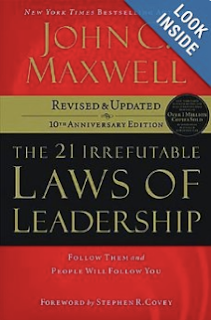WHO Comes To Mind When You Think Of Amazing Leadership?
 |
| Photo: Courtesy Jim Bowen on Flickr |
In this book, John C. Maxwell writes as though his life purpose is to develop your leadership abilities and qualities. His style makes him both approachable and trustworthy, as someone you might seek out as a mentor. It is obvious that his life passion is to pass along these "laws of leadership" in an effort to encourage and build up those who are looking to improve their lives in this area.
In writing this 10th Anniversary updated edition, Maxwell explains that while he hasn't changed the laws he wrote about so many years ago, that he has definitely found ways to expand on and improve on those laws that have effectively proven, over and over again, to help so many throughout the years.
He gives some advice for those who decide to read and study his 21 laws of leadership:
Leadership principles are unchanging and stand the test of time. As you read the following chapters, I'd like you to keep in mind four ideas:
- The laws can be learned. Some are easier to understand and apply than others, but every one of them can be acquired.
- The laws can stand alone. Each law complements all the others, but you don't need one in order to learn another.
- The laws carry consequences with them. Apply the laws, and people will follow you. Violate or ignore them, and you will not be able to lead others.
- These laws are the foundation of leadership. Once you learn the principles, you have to practice them and apply them to your life.
Whether you are a follower who is just beginning to discover the impact of leadership or a natural leader who already has followers, you can become a better leader...No matter where you are in the leadership process, know this: the greater number of laws you learn, the better leader you will become. Each law is like a tool, ready to be picked up and used to help you achieve your dreams and add value to other people. Pick up even one, and you will become a better leader. Learn them all, and people will gladly follow you.
Every single person has a leadership role in one way or another. To say that this subject on leadership development is useless is ignorant on our part. Every single day, whether directly or indirectly, we are leading and impacting people around us.
Look around you today and ask yourself who is watching you, and what you need to do to improve the natural leader within.










